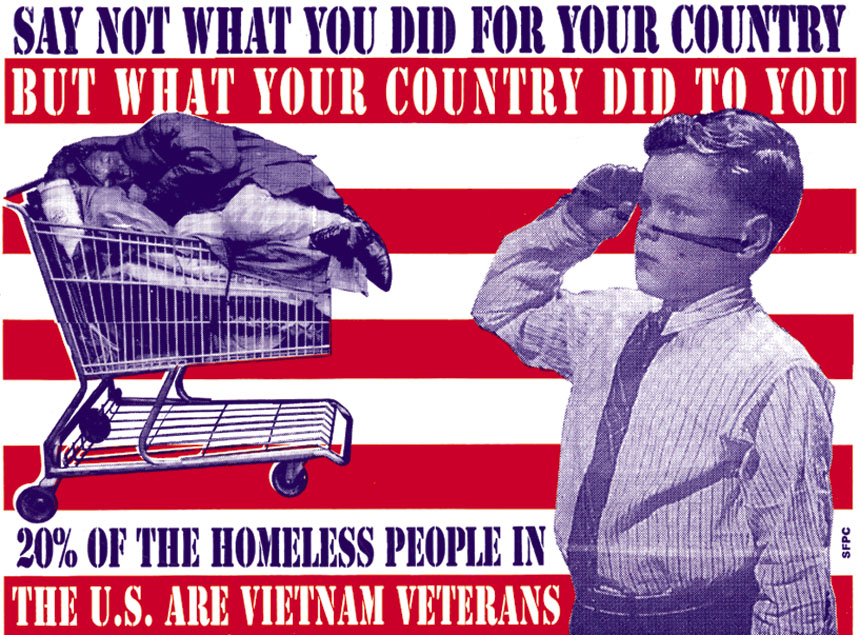
[fblike style=”button_count” showfaces=”false” width=”450″ verb=”like” font=”arial”]
by Judy Andreas
[dropcap]O[/dropcap]n Friday, April 15, 2005, I stood in front of our local courthouse protesting the War in Iraq. It was tax day and we were trying to make a point about how our tax dollars were being used.
Many cars passed by and gave us an approving honk. Other drivers gave us a disapproving third finger. Some of the cars had “support our troops” proudly displayed on their bumpers. It might have been 2005, but it seems like only yesterday.
Has anything changed? “Support our troops?” Does anyone question those words when they mindlessly slap the bright yellow sticker on their vehicle?
I’m thinking back on that day of protest, because it was back in 2005 that our small county had its first fatality in Iraq. His name was Army Spc. Manny Lopez. After the tragedy hit the newspaper, grief-stricken people called the local radio station to give voice to their pain.
One woman uttered, through her tears, “He died for our freedom.”
He died for our freedom? I wish someone would help me understand how killing innocent people in the Middle East is keeping us free. What has sending soldiers to be poisoned and to die have to do with our freedom? In my lexicon of logic, the belief that “he died for our freedom,” is just about as meaningless as “support our troops.”
On that particular tax day, we carried signs in front of the courthouse. I chose a sign that featured a picture of an Iraqi veteran named Herold Noel. Unlike Manny Lopez, Noel came home from the war. In fact, he came home a hero — but it was not long before he wound up homeless.
Byron Pitts of CBS News did a report on Herold Noel on March 25, 2005.
When “Iraqi Freedom” first began, Private First Class Noel was a soldier in the U.S. Army’s 3rd Infantry Division, pounding a path into Baghdad. “I fought for this country,” Noel said. “I shed blood for this country. I watched friends die.”
Noel was forced to live in his jeep after being robbed at a homeless shelter. He put in applications for housing but was told they were lost.
Pitts’ report talked about how veterans are coming home with mental health issues and substance abuse problems.
“Mental health issues?” Once again I am going to have to admit ignorance. That phrase is amorphous and ambiguous. I cannot help but wonder how many of these “mental health issues” are manifestations of depleted uranium.
Leuren Moret is a geoscientist who has worked around the world on radiation issues, educating citizens, the media, members of parliaments and Congress and other officials. Ms. Moret calls depleted uranium a death sentence. “Depleted uranium: Dirty bombs, dirty missiles, dirty bullets: A death sentence here and abroad.”
A Japanese professor, Dr. K. Yagasaki, has calculated that 800 tons of depleted uranium (DU) is the atomicity equivalent of 83,000 Nagasaki bombs. The United States has used more DU since 1991 than the atomicity equivalent of 400,000 Nagasaki bombs. We have released 10 times the amount of radiation released into the atmosphere from atmospheric testing!
No wonder our soldiers, their families and the people of the Middle East, Yugoslavia and Central Asia are sick.
“The long-term effects have revealed that DU (uranium oxide) is a virtual death sentence,” stated Arthur N. Bernklau, executive director of Veterans for Constitutional Law in New York.
“Marion Fulk, a nuclear physical chemist, who retired from the Lawrence Livermore Nuclear Weapons Lab, and was also involved with the Manhattan Project, interprets the new and rapid malignancies in the soldiers (from the 2003 Iraq War) as ‘spectacular — and a matter of concern!’”
Noel was diagnosed with post traumatic stress disorder. Unemployed and married with three kids, he couldn’t get a job.
Waking people up from the nightmare is not easy. While the people busily “support the troops” what does the government do? Does our government “support the troops” as it cuts their benefits?
Does the government “support our troops” when it sends them into battle with inadequate equipment? Does the government “support the troops” when it turns its back on the casualties of the war? Does the government “support the troops” as it casts Herold Noel and countless others onto the streets?
Not long ago I watched a powerful movie called “Homeless to Harvard,” based on the true story of a young girl, Liz Murray, whose parents were drug addicts dying of AIDS. After dropping out of school and living on the street, this heroic young woman became determined to get an education.
Though she ate out of dumpsters and slept on the subway, she ultimately finished high school in two years and got a New York Times scholarship to Harvard University. It was a deeply moving story. It was a story filled with hope. And yet, it was obviously unique. Most young people in Liz’s situation succumb to a life of hopelessness.
This year, I once again stood in front of our local courthouse protesting war. Yet, in my case, the protest was aimed at all the wars — past, present and future. My protest was aimed at the abuse of people all around the globe. My protest was aimed at the lies and deception and greed of the globalists and the sadly hypnotized populace that is willing to kill and be killed without knowing why.
I carried a sign that had a picture of Noel. The sign read “From Hero to Homeless.” It was a story filled with despair. Sadly, Noel’s story, unlike Liz’s, is not unique. As many as 275,000 veterans will likely sleep out in the cold tonight.
